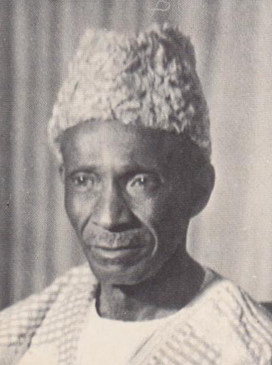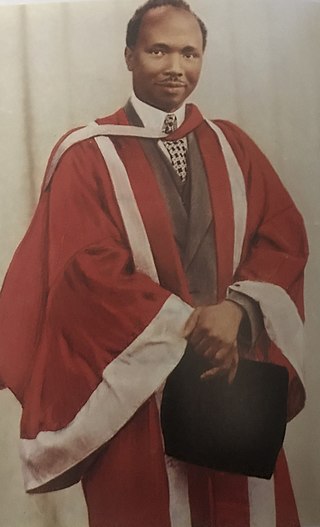Related Research Articles

Sierra Leone, officially the Republic of Sierra Leone, is a country on the southwest coast of West Africa. It is bordered to the southeast by Liberia and by Guinea to the north. Its land area is 73,252 km2 (28,283 sq mi). It has a tropical climate and environments ranging from savannas to rainforests. As of the 2023 census, Sierra Leone has a population of 8,908,040. Freetown is both its capital and its largest city. The country is divided into five administrative regions, which are further subdivided into 16 districts.

The Republic of Sierra Leone Armed Forces are the armed forces of Sierra Leone, responsible for the territorial security of Sierra Leone's borders and defending the national interests of Sierra Leone, within the framework of the 1991 Sierra Leone Constitution and International laws. The armed forces were formed after independence in 1961, on the basis of elements of the former British Royal West African Frontier Force, then present in the Sierra Leone Colony and Protectorate.

Sir Milton Augustus Strieby Margai was a Sierra Leonean physician and politician who served as the country's head of government from 1954 until his death in 1964. He was titled chief minister from 1954 to 1960, and then prime minister from 1961 onwards. Margai studied medicine in England, and upon returning to his homeland became a prominent public health campaigner. He entered politics as the founder and inaugural leader of the Sierra Leone People's Party. Margai oversaw Sierra Leone's transition to independence, which occurred in 1961. He died in office aged 68, and was succeeded as prime minister by his brother Albert. Margai enjoyed the support of Sierra Leoneans across classes, who respected his moderate style, friendly demeanor, and political savvy.

Alhaji Ahmad Tejan Kabbah was a Sierra Leonean politician who served twice as the 3rd President of Sierra Leone, from 1996 to 1997 and again from 1998 to 2007. An economist and attorney by profession, Kabbah spent many years working for the United Nations Development Programme. He retired from the United Nations and returned to Sierra Leone in 1992.

Siaka Probyn Stevens was the leader of Sierra Leone from 1967 to 1985, serving as Prime Minister from 1967 to 1971 and as President from 1971 to 1985. Stevens' leadership was often characterized by patrimonial rule and self-indulgence, consolidating power by means of corruption and exploitation.
Valentine Esegragbo Melvine Strasser is a former Sierra Leonean military officer who served as head of state of Sierra Leone from 1992 to 1996. He became the world's youngest Head of State in 1992, seizing power three days after his 25th birthday.

Julius Maada Wonie Bio is a Sierra Leonean politician and 5th and current president of Sierra Leone since 4 April 2018. He is a retired brigadier in the Sierra Leone Army and was the military head of state of Sierra Leone from 16 January 1996 to 29 March 1996, at only 32 years old in a military junta government known as the National Provisional Ruling Council (NPRC). Bio is the first democratically elected president of Sierra Leone born after Sierra Leone's independence from British colonial rule in 1961. As president Bio has implemented free primary and secondary school education in government schools throughout Sierra Leone and has repealed the death penalty in the country after it was passed Parliament.
The Sierra Leonean Civil War (1991–2002) was a civil war in Sierra Leone that began on 23 March 1991 when the Revolutionary United Front (RUF), with support from the special forces of Liberian dictator Charles Taylor's National Patriotic Front of Liberia (NPFL), intervened in Sierra Leone in an attempt to overthrow the Joseph Momoh government. The resulting civil war lasted almost 11 years, and had over 50,000, up to 70,000, casualties in total; an estimated 2.5 million people were displaced during the conflict, and widespread atrocities occurred.
Mohamed Kallon MOR is a Sierra Leonean football manager and former player who played as a striker. He played for Inter Milan from 2001 to 2004, competing for spots with players such as Christian Vieri, Ronaldo, Álvaro Recoba, Adriano, Hakan Şükür and Nicola Ventola. He is widely considered the most famous footballer from Sierra Leone.

The Special Court for Sierra Leone, or the "Special Court" (SCSL), also called the Sierra Leone Tribunal, was a judicial body set up by the government of Sierra Leone and the United Nations to "prosecute persons who bear the greatest responsibility for serious violations of international humanitarian law and Sierra Leonean law" committed in Sierra Leone after 30 November 1996 and during the Sierra Leone Civil War. The court's working language was English. The court listed offices in Freetown, The Hague, and New York City.
John Albert Musselman Karefa-Smart was a Sierra Leonean politician, medical doctor and university professor. He served as the first Foreign Minister under Sierra Leone's first Prime Minister, Sir Milton Margai. He was an ordained Elder of the United Methodist Church.
Edward Mohamed Turay was a Sierra Leonean politician and diplomat. He was leader of the opposition All People's Congress (APC) from 1996 to 2002. He was the Sierra Leonean High Commissioner to the United Kingdom from 2010 until his death in 2023.
Musa Kallon is a Sierra Leonean football coach and former player. He is the older brother of Sierra Leonean international footballers Mohamed Kallon, and Kemokai Kallon.
Professor Cyril Patrick Foray was a Sierra Leonean educator, politician, diplomat and historian.
Ibrahim "Inspector" Bah is a former Sierra Leonean professional footballer. His nickname amongst Sierra Leonean football fans is 'Inspector' Bah.

Robert Benjamin Ageh Wellesley Cole, was a Sierra Leonean medical doctor who was the first West African to become a Fellow of the Royal College of Surgeons of England.
Literature of Sierra Leone is the collection of written and spoken work, mostly fictional, from Sierra Leone. The coastal west-African country suffered a civil war from 1991 until 2002. Before the civil war, Sierra Leone had many writers contributing to its literature and since the end of the war the country has been in the process of rebuilding this literature. This is an overview of some important aspects of the literature of Sierra Leone before, during, and after the war.

India–Sierra Leone relations refers to the international relations that exist between India and Sierra Leone. India maintains a High Commission in Freetown. Sierra Leone does not have a resident diplomatic mission in India. The Sierra Leonean embassy in Abu Dhabi, United Arab Emirates is accredited to India.

Mohamed Juldeh Jalloh is a Sierra Leonean politician and the current vice president of Sierra Leone since 4 April 2018. Jalloh is a political scientist, businessman and a former United Nations official. Jalloh is a senior member of the Sierra Leone People's Party.

Sierra Leonean nationality law is regulated by the Constitution of Sierra Leone, as amended; the Citizenship Act, and its revisions; and various international agreements to which the country is a signatory. These laws determine who is, or is eligible to be, a national of Sierra Leone. The legal means to acquire nationality, formal legal membership in a nation, differ from the domestic relationship of rights and obligations between a national and the nation, known as citizenship. Nationality describes the relationship of an individual to the state under international law, whereas citizenship is the domestic relationship of an individual within the nation. In Britain and thus the Commonwealth of Nations, though the terms are often used synonymously outside of law, they are governed by different statutes and regulated by different authorities. Sierra Leonean nationality is based on descent from a person who is Negro-African, regardless of whether they were born in Sierra Leone, jus soli, or abroad to a Sierra Leonean, jus sanguinis. The Negro clause was inserted based upon the founding of the colony as a refuge for former slaves to prevent economically powerful communities from obtaining political power. It can be granted to persons with an affiliation to the country, or to a permanent resident who has lived in the country for a given period of time through naturalisation.